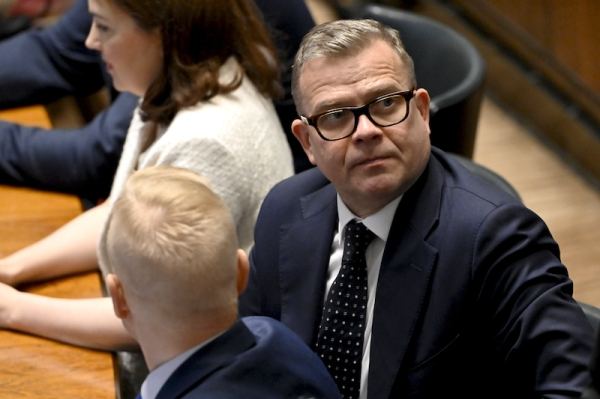
Prime Minister Petteri Orpo in a plenary session of Parliament in Helsinki on 4 June 2025. The government responded in the session to an interpellation by the Centre Party regarding the government’s record-high borrowing. Photo: Emmi Korhonen / Lehtikuva
- Previous Article Finnish Parliament extends pushback law until 2026
- Next Article Basic social assistance spending in Finland to exceed €1 billion in 2025
Finland has avoided being placed under the European Union’s excessive deficit procedure (EDP), despite breaching key public finance rules. The European Commission accepted a defence spending exemption that lowered the country’s calculated deficit, allowing the Orpo government to sidestep a politically sensitive designation.
The EDP, known in Finland as the “observation class,” applies to member states whose annual budget deficit exceeds 3 percent of gross domestic product or whose total debt surpasses 60 percent of GDP. Finland’s deficit was 4.4 percent last year and is forecast to reach 3.7 percent this year. National debt remains over 80 percent of GDP.
Ordinarily, such figures would trigger the EU’s deficit procedure. This time, Finland narrowly avoided it due to an adjustment granted for increased defence expenditure, which is not fully counted against the deficit under revised EU rules.
The Commission also chose not to penalise Finland for its 2024 overrun, citing exceptional circumstances and budgetary adjustments already introduced by Prime Minister Petteri Orpo’s government.
The Finnish Ministry of Finance confirmed that the exemption followed detailed talks with EU officials in recent months. Several other countries, including Latvia, received the same consideration. Without the exemption, Finland’s figures would have placed it among the ten countries now under the procedure.
Those currently included are France, Italy, Poland, Belgium, Hungary, Malta, Slovakia, Romania, and new entrant Austria.
Despite the procedural leniency, the Commission’s spring forecast still reflects Finland’s structural challenges. The country’s annual deficit remains above target, and efforts to narrow it are ongoing.
The Orpo administration had framed avoidance of the EDP as a central justification for its public finance reforms. The government has implemented multi-billion euro spending cuts and structural adjustments since taking office in 2023. These measures, coupled with continued economic uncertainty, are intended to stabilise the debt trajectory.
Yet the government also enacted tax cuts earlier this year totalling several billion euros, which increased the risk of breaching EU rules. Finance Ministry Permanent Secretary Juha Majanen acknowledged the heightened risk during a recent media interview.
“Yes, the risk did increase somewhat,” Majanen said.
According to EU regulations, countries placed under the EDP must submit an action plan showing how they will bring deficits back within limits. The Commission can issue recommendations and, in rare cases, impose fines. In practice, sanctions are seldom applied.
While the process itself carries minimal financial consequences, the symbolic impact is politically significant in Finland. Orpo and Finance Minister Riikka Purra have repeatedly insisted that compliance with EU fiscal rules is a national priority.
Failure to meet those rules could undermine Finland’s credibility in EU economic discussions and reduce its influence in upcoming budget negotiations. It might also complicate efforts to attract investment and maintain stable borrowing costs, although financial markets had already priced in the government’s budget data.
For now, Finland’s escape from formal proceedings offers a short-term political win for the government. But the structural challenges remain, and compliance in 2026 will require continued restraint or new
Source: www.helsinkitimes.fi
